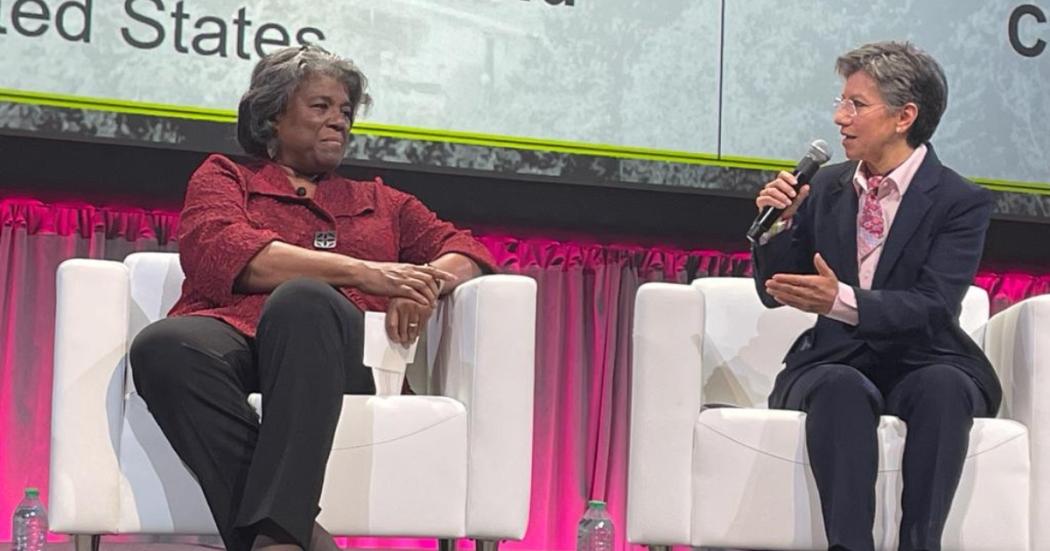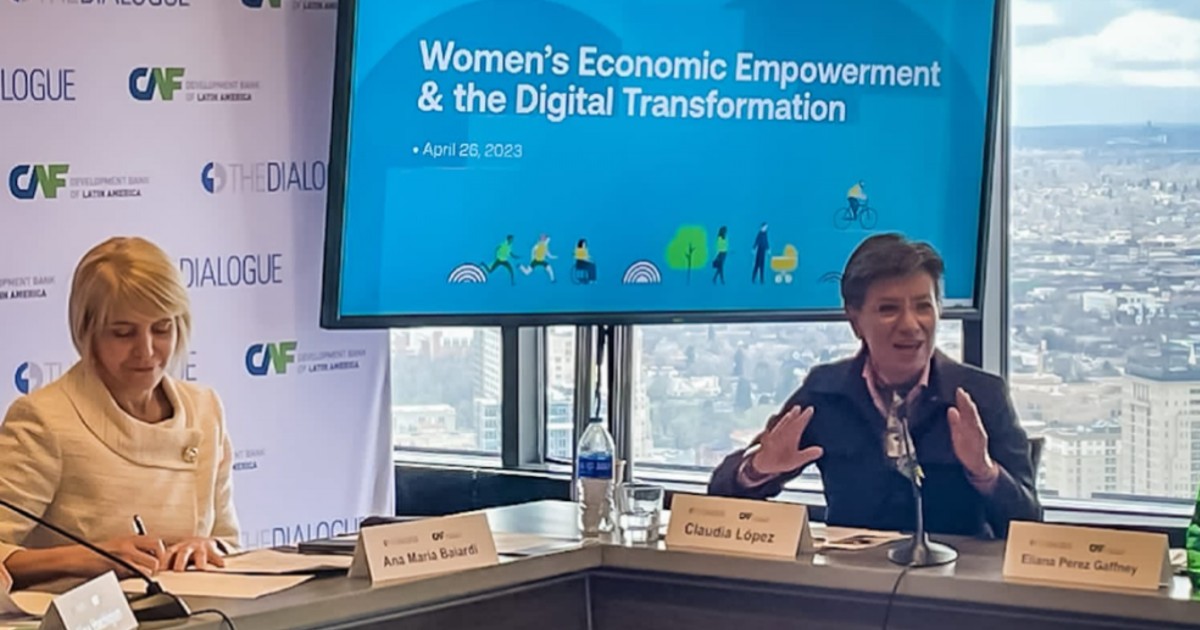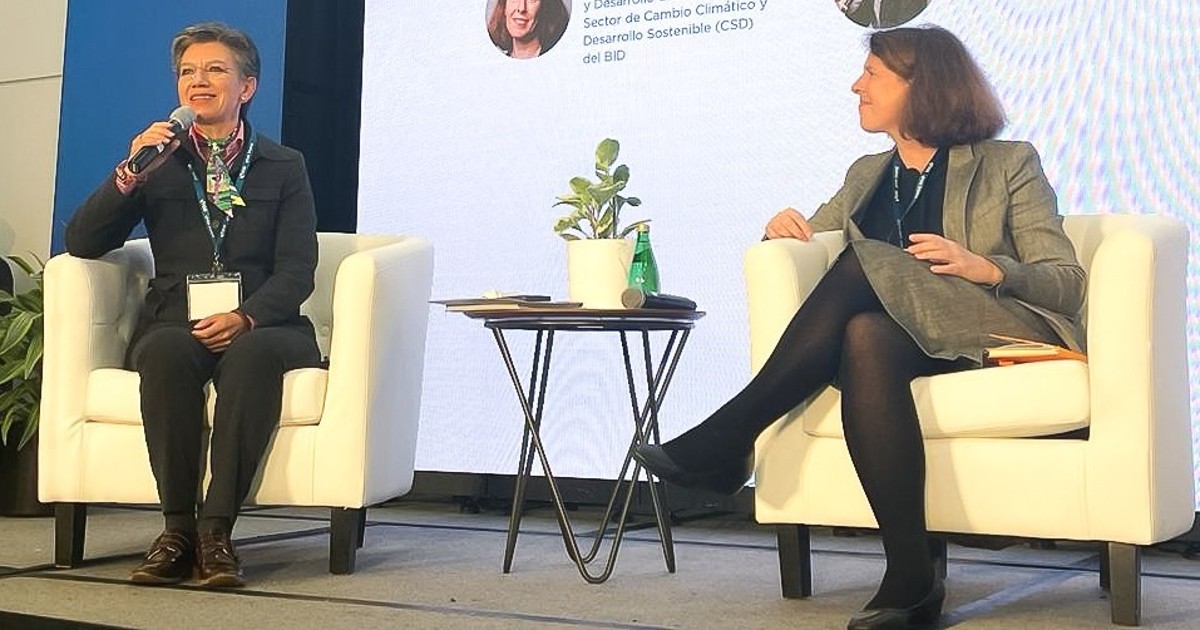During the First Cities Summit of the Américas held in the United States, Mayor of Bogotá Claudia López proposed to join efforts and establish a new social and environmental pact for the Americas, led locally.
During a panel titled "Connectivity and the Role of Cities in Global Leadership," she stated: "I believe it's time for a new social and environmental pact in the Americas to meet global challenges such as the Sustainable Development Goals. We need people not to be in spaces of violence, but of innovation. We must use all innovations to create entrepreneurship and green job opportunities for young people and women, right now!"
In addition to her busy agenda, Mayor López also held meetings with Brian Nichols, the Assistant Secretary of State for Western Hemisphere Affairs, and Senator Chris Dodd, with whom she discussed her proposal for a "New Deal" social and environmental agreement that would allow citizens to grow and thrive where they were born, expanding opportunities for education, employment, and green, digital, and care entrepreneurship in the 21st century for young people and women.
"Great meeting with Mayor of Bogotá, Colombia Claudia López at the Cities Summit of the Americas. Her work championing equity, inclusion, sustainability, and support for vulnerable communities is a model for other cities to follow," highlighted the North American official after the meeting held in the morning before the formal sessions of the summit.
In this tweet, you can see a part of the Mayor's intervention:
Hay un nuevo multilateralismo del siglo XXI y es necesario incluir a las comunidades para abordar desafíos y unir fuerzas que cambien el rumbo porque el tiempo se acaba!
— Claudia López Hernández (@ClaudiaLopez) April 28, 2023
La inclusión social, los valores democráticos y la sostenibilidad ambiental se construyen en nuestras… pic.twitter.com/qxV2F6hAv6
Mobility and Transportation
Mobility in cities was evaluated during the summit, where Mayor Claudia López participated in a panel on mobility and transportation with her counterparts from Mexico City, Claudia Sheinbaum, and Quito, Santiago Guarderas. The panel, organized by the World Resources Institute and the CAF, aimed to highlight "Complete Streets," a concept used to refer to roads designed for people of all ages and abilities to coexist and transit safely, accessibly, and efficiently with the purpose of incorporating the concept into sustainable urban development agendas and boosting its capacity to improve safety, equitable access, and urban cooling.
For Complete Streets, the pedestrian is the protagonist and fundamental actor in the active life of the city, a public setting that must enhance the urban environment and generate a sense of ownership for its protection, use, and enjoyment, the panelists concluded during the discussion.
"The king of the streets in the 20th century was the vehicle, but the king of the streets in the 21st century should be the pedestrian, families, greenery, and safety. That's what we're trying to achieve in Bogotá," explained the Mayor, recalling that 7% of daily trips in the city are made by bicycle.
In this context, the Mayor highlighted the ongoing projects of her administration aimed at achieving a multimodal city in terms of transportation, including the metro, trams, green corridor, electric buses, cable cars, and bike paths.
Earlier, the Mayor had also participated in a discussion space promoted by the prestigious Financial Times, in collaboration with Millicom Tigo, a mobile operator, with the purpose of exploring how collaboration between the public and private sectors can ensure that Latin American cities and communities benefit from digital ecosystems.
Ilan Goldfajn, President of the Inter-American Development Bank (IDB), was also present at the event. He was interviewed and participated in a discussion panel focused on how investments in technology and improved connectivity can reduce social gaps, create jobs, and boost productivity in the region to take advantage of global and local opportunities.
Regarding this topic, Mayor Claudia López highlighted the creation of AGATA, Bogotá's public data analysis agency, as it allows for the promotion of technological development, fostering innovation, and digital inclusion.
During her presentation, Mayor López highlighted concrete issues, such as the need to establish a credit rating for the informal sector and small businesses.
"This rating is essential since there is the phenomenon of 'gota a gota' loans, a criminal practice that is not due to a lack of funds available for loans, as many companies are interested in investing in this sector of the population. It is due to the lack of a credit rating that reflects the effective use of money by borrowers. By obtaining information on spending patterns, such as transportation and public services payments, we can estimate how much money is being used and establish a credit rating that allows for determining possible loan amounts or the creation of a digital wallet. This is precisely what we are doing with AGATA," she stated.
Another important meeting held on Thursday in Denver was with Gerry Eijkemans, Director Social and Environmental Determinants for Health Equity at the Pan American Health Organization (PAHO), who highlighted that Bogotá is a leader in healthy cities and considers that the Colombian capital can inspire the movement of healthy municipalities and cities in the region.
To close the day, the Mayor also met with the Mayor of Rio de Janeiro, Brazil, Eduardo da Costa Paes, to discuss shared challenges in the region and managing mobility in megacities such as Bogotá and Rio de Janeiro, as well as local security issues.








